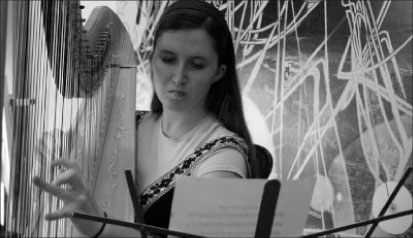It has been played by angels for centuries and was once placed on a pedestal as a fragile, classical instrument, but is now seen by many as a dying art. Stereotypes have followed the harp for years. But Jordan Andrew, a sophomore English and Spanish major, has brought a different sensibility to the harp: unconventional, complex, and down-to-earth.
When she was just seven years old, Andrew accompanied her grandmother to the St. James Art Fair. There, they were both drawn toward a group of women playing the harp. Andrew’s grandmother bought her a harp immediately afterwards and paid for lessons because both of them were mesmerized by the instrument.
Andrew caught on quickly and rapidly ran through her first music book. When she needed a larger, more advanced harp, Andrew went searching online. She stumbled upon one that she fell in love with and has been using it ever since.
“It’s almost like the harp has found me as much as I have found it,” she said. Andrew’s entire career has been full of coincidence, but has seemed to work itself out perfectly since she first plucked a string.
Andrew is currently one of only two harp players at the University of Louisville. She practices about six hours a week at the music school, but also focuses on her other studies, with an intention of going pre-med.
“I don’t fit into one category. I write, which helps my music creatively, and vice versa,” Andrew said. “But I am also scientific and I can make my music accurate and precise. .”
Calling herself a true “improviser,” Andrew writes her own music and reworks music meant for other instruments to play on her harp. She performs at weddings and churches for money as well as charity, but mostly, for herself.
Andrew Murphey, a close friend of Andrew, said, “People often misinterpret her personality. She’s mature way beyond her years, but she doesn’t flaunt it. She’s got this passionate, methodical, disciplined sense about her that I think comes from playing the harp.”
Andrew wants to continue playing the harp for the rest of her life, but has a definite plan for her future. She’s passionate about Africa and volunteering in general; she said that it has always amazed her that simple things, like her harp, can make people so happy.
As she played her own composition, she seemed to fit perfectly with her harp. Its delicate, golden flowers flowed down its side just as easily as her fingers flowed through the strings, and its casual woodwork seemed to complement her patched jeans and natural style.
It was obvious that the harp has become a part of her. “I think that a musical instrument should accentuate who you are,” said Andrew, “not become who you are.”
Stereotypes have tried to define her through twelve years of playing, but Andrew has made it a point to break them all.






